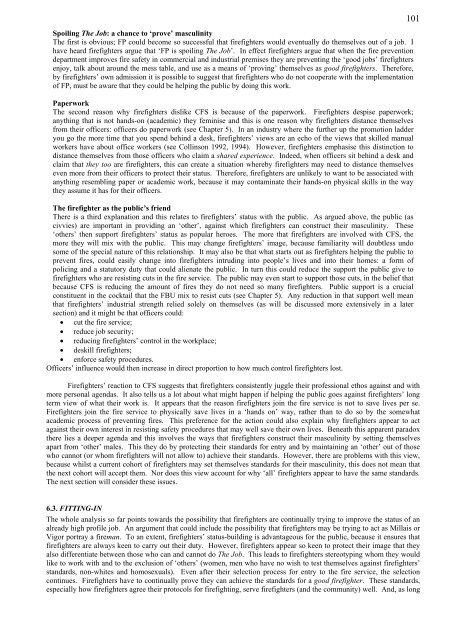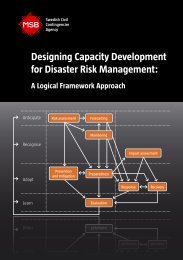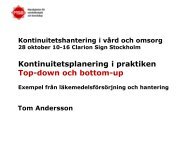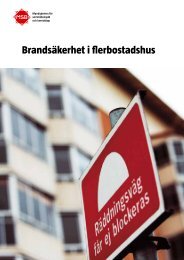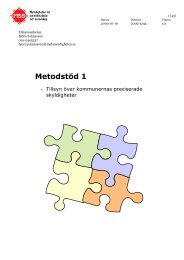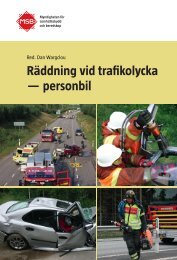One more last working class hero
One more last working class hero
One more last working class hero
You also want an ePaper? Increase the reach of your titles
YUMPU automatically turns print PDFs into web optimized ePapers that Google loves.
Spoiling The Job: a chance to ‘prove’ masculinity<br />
The first is obvious; FP could become so successful that firefighters would eventually do themselves out of a job. I<br />
have heard firefighters argue that ‘FP is spoiling The Job’. In effect firefighters argue that when the fire prevention<br />
department improves fire safety in commercial and industrial premises they are preventing the ‘good jobs’ firefighters<br />
enjoy, talk about around the mess table, and use as a means of ‘proving’ themselves as good firefighters. Therefore,<br />
by firefighters’ own admission it is possible to suggest that firefighters who do not cooperate with the implementation<br />
of FP, must be aware that they could be helping the public by doing this work.<br />
Paperwork<br />
The second reason why firefighters dislike CFS is because of the paperwork. Firefighters despise paperwork;<br />
anything that is not hands-on (academic) they feminise and this is one reason why firefighters distance themselves<br />
from their officers: officers do paperwork (see Chapter 5). In an industry where the further up the promotion ladder<br />
you go the <strong>more</strong> time that you spend behind a desk, firefighters’ views are an echo of the views that skilled manual<br />
workers have about office workers (see Collinson 1992, 1994). However, firefighters emphasise this distinction to<br />
distance themselves from those officers who claim a shared experience. Indeed, when officers sit behind a desk and<br />
claim that they too are firefighters, this can create a situation whereby firefighters may need to distance themselves<br />
even <strong>more</strong> from their officers to protect their status. Therefore, firefighters are unlikely to want to be associated with<br />
anything resembling paper or academic work, because it may contaminate their hands-on physical skills in the way<br />
they assume it has for their officers.<br />
The firefighter as the public’s friend<br />
There is a third explanation and this relates to firefighters’ status with the public. As argued above, the public (as<br />
civvies) are important in providing an ‘other’, against which firefighters can construct their masculinity. These<br />
‘others’ then support firefighters’ status as popular <strong>hero</strong>es. The <strong>more</strong> that firefighters are involved with CFS, the<br />
<strong>more</strong> they will mix with the public. This may change firefighters’ image, because familiarity will doubtless undo<br />
some of the special nature of this relationship. It may also be that what starts out as firefighters helping the public to<br />
prevent fires, could easily change into firefighters intruding into people’s lives and into their homes: a form of<br />
policing and a statutory duty that could alienate the public. In turn this could reduce the support the public give to<br />
firefighters who are resisting cuts in the fire service. The public may even start to support those cuts, in the belief that<br />
because CFS is reducing the amount of fires they do not need so many firefighters. Public support is a crucial<br />
constituent in the cocktail that the FBU mix to resist cuts (see Chapter 5). Any reduction in that support well mean<br />
that firefighters’ industrial strength relied solely on themselves (as will be discussed <strong>more</strong> extensively in a later<br />
section) and it might be that officers could:<br />
• cut the fire service;<br />
• reduce job security;<br />
• reducing firefighters’ control in the workplace;<br />
• deskill firefighters;<br />
• enforce safety procedures.<br />
Officers’ influence would then increase in direct proportion to how much control firefighters lost.<br />
Firefighters’ reaction to CFS suggests that firefighters consistently juggle their professional ethos against and with<br />
<strong>more</strong> personal agendas. It also tells us a lot about what might happen if helping the public goes against firefighters’ long<br />
term view of what their work is. It appears that the reason firefighters join the fire service is not to save lives per se.<br />
Firefighters join the fire service to physically save lives in a ‘hands on’ way, rather than to do so by the somewhat<br />
academic process of preventing fires. This preference for the action could also explain why firefighters appear to act<br />
against their own interest in resisting safety procedures that may well save their own lives. Beneath this apparent paradox<br />
there lies a deeper agenda and this involves the ways that firefighters construct their masculinity by setting themselves<br />
apart from ‘other’ males. This they do by protecting their standards for entry and by maintaining an ‘other’ out of those<br />
who cannot (or whom firefighters will not allow to) achieve their standards. However, there are problems with this view,<br />
because whilst a current cohort of firefighters may set themselves standards for their masculinity, this does not mean that<br />
the next cohort will accept them. Nor does this view account for why ‘all’ firefighters appear to have the same standards.<br />
The next section will consider these issues.<br />
101<br />
6.3. FITTING-IN<br />
The whole analysis so far points towards the possibility that firefighters are continually trying to improve the status of an<br />
already high profile job. An argument that could include the possibility that firefighters may be trying to act as Millais or<br />
Vigor portray a fireman. To an extent, firefighters’ status-building is advantageous for the public, because it ensures that<br />
firefighters are always keen to carry out their duty. However, firefighters appear so keen to protect their image that they<br />
also differentiate between those who can and cannot do The Job. This leads to firefighters stereotyping whom they would<br />
like to work with and to the exclusion of ‘others’ (women, men who have no wish to test themselves against firefighters’<br />
standards, non-whites and homosexuals). Even after their selection process for entry to the fire service, the selection<br />
continues. Firefighters have to continually prove they can achieve the standards for a good firefighter. These standards,<br />
especially how firefighters agree their protocols for firefighting, serve firefighters (and the community) well. And, as long


